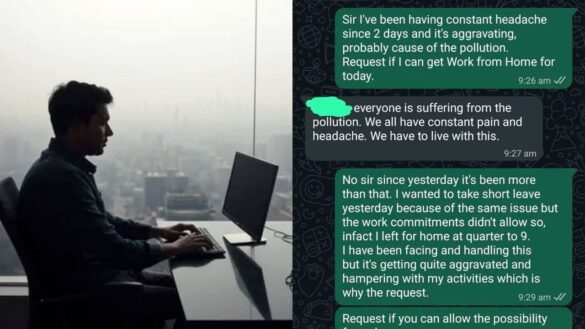Delhi’s pollution crisis has once again pushed people into a difficult situation. Every November, the capital experiences dangerous levels of smog, but this year many residents say the air feels worse than ever. With AQI touching hazardous levels, doctors and government advisories clearly suggest people—especially young professionals—should avoid outdoor travel as much as possible.
Amid this situation, one corporate employee from Delhi faced a different challenge. While she was dealing with pollution-related health issues, she also had to deal with a workplace that showed little flexibility.
Employee Requests WFH During Smog, Manager Refuses
A 25-year-old employee shared her experience on an online platform, where she explained how pollution was affecting her health. She had been struggling with continuous headaches for two days. Despite this, she continued working from the office until late at night to finish her tasks.
The next morning, when her symptoms worsened, she made a simple request to her manager: one day of work from home, just to avoid traveling through toxic smog.
However, the reply she received shocked many people online.
Manager’s Reply Sparks Outrage
Instead of showing concern, the manager compared her situation with everyone else in the city. He responded that everyone is suffering and that she should continue coming to the office because others were doing the same.
Even after she explained that the headache was affecting her work and that she didn’t want to take leave, the manager maintained his stand. He insisted WFH was not possible and asked her to send an email to HR if she wanted time off due to pollution.
The chat quickly spread online, and many users felt the response lacked empathy.
Air Purifier Requests Also Ignored
The employee also mentioned that her team had repeatedly asked for air purifiers in the office, but management did not take action. Many users felt this showed how companies often ignore basic health requirements, even during a severe environmental crisis.
Internet Reacts Strongly
Once the conversation went viral, thousands of people commented on the situation. Many pointed out a common problem in Indian corporate culture:
“If I can suffer, you can suffer too.”
Several users said that the employee should have simply taken sick leave. Others criticised the manager for ignoring health advisories that clearly warn people about the dangers of breathing toxic air.
Overall, the reactions highlighted how workplaces often prioritise rules over well-being.
Conclusion
Delhi’s annual pollution crisis exposes not just environmental issues but also the gaps in workplace empathy. This incident shows how some companies still fail to understand the seriousness of health problems during hazardous weather conditions. As more people speak out online, there is growing pressure on organisations to rethink their policies and show more support to employees—especially during emergencies.
FAQs
What happened in the viral chat?
The employee requested WFH due to severe headache caused by pollution, but the manager rejected it, saying everyone is facing the same issue.
Why did the employee ask for WFH?
She had continuous headaches for two days and wanted to avoid traveling in polluted air, while still completing her work.
How did people react online?
Most users criticised the manager for lacking empathy and said companies should prioritise employee health during pollution emergencies.
Did the company provide air purifiers?
According to the employee, the management ignored repeated requests for air purifiers in the office.
Is WFH common during pollution season?
Some companies allow WFH, but many still insist on office attendance despite health concerns.

